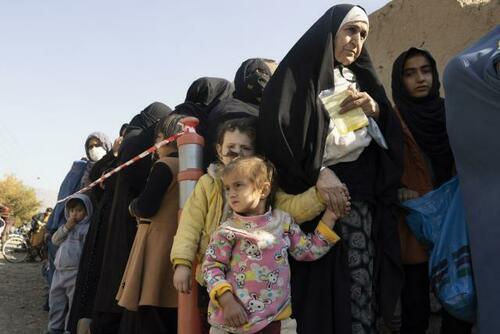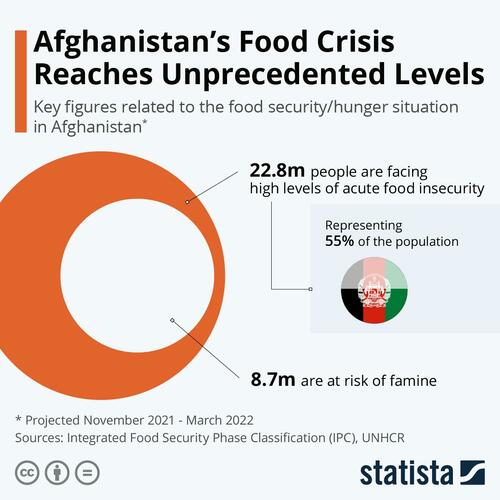
With this week marking a grim one-year anniversary of the Taliban takeover of Kabul, ending more than two decades of US and coalition occupation of the country in (now failed) attempts to prop up a national government, The Wall Street Journal reported Monday the White House will not release any of the $7 billion in Afghan central bank reserves still being held by the US.
Prior talks with Taliban officials who sought to get the funds released as the population faces hunger and a post-war collapsed economy have also been suspended. Biden administration officials cited that a key factor in the decision to block funds indefinitely was that al-Qaeda leader Ayman al-Zawahiri was found to be living safely in Kabul. That is, until a CIA drone strike which reportedly killed the notorious al-Qaeda leader on July 31.

However, it was revealed in the aftermath that the US has no DNA evidence or body proving that it was Zawahiri that was killed in the strike. The strong suggestion is of course that the Taliban allowed the AQ leader to take up residence in the Afghan capital soon after the US force withdrawal.
US Special Representative for Afghanistan Thomas West told the WSJ: "Needless to say, the Taliban’s sheltering of Al Qaeda leader Ayman al-Zawahiri reinforces deep concerns we have regarding diversion of funds to terrorist groups."
On the question of the Taliban accessing humanitarian aid for the population, West said, "We do not see recapitalization of the Afghan central bank as a near-term option," adding that: "We do not have confidence that that institution has the safeguards and monitoring in place to manage assets responsibly."
Previously Biden has said he plans to give half of the $7 billion in seized Afghan assets to families of 9/11 victims, with the other half going to a trust fund for future humanitarian aid to the Afghan people. But with this latest announcement, even that option appears to be off the table given it would of necessity be the Taliban distributing the aid as the de facto authority should the funds ever be unblocked.
Months ago a United Nations statement warned that a dire food shortage crisis now threatens an "entire generation of Afghans" - with a report warning that up to 95% of the population is not getting enough to eat. Critics have decried the Biden admin's decision as "theft" and unjust collective punishment:
"It is both morally condemnable and politically and economically reckless to impose collective punishment on an entire people for the actions of a government they did not choose," reads a letter drafted by 70 economists and experts which was delivered to the White House last week.
You will find more infographics at Statista
The Taliban remains an internationally sanctioned entity, with an additional some $2 billion of Afghanistan’s funds having been frozen by other countries, following Washington's lead.
With this week marking a grim one-year anniversary of the Taliban takeover of Kabul, ending more than two decades of US and coalition occupation of the country in (now failed) attempts to prop up a national government, The Wall Street Journal reported Monday the White House will not release any of the $7 billion in Afghan central bank reserves still being held by the US.
Prior talks with Taliban officials who sought to get the funds released as the population faces hunger and a post-war collapsed economy have also been suspended. Biden administration officials cited that a key factor in the decision to block funds indefinitely was that al-Qaeda leader Ayman al-Zawahiri was found to be living safely in Kabul. That is, until a CIA drone strike which reportedly killed the notorious al-Qaeda leader on July 31.

However, it was revealed in the aftermath that the US has no DNA evidence or body proving that it was Zawahiri that was killed in the strike. The strong suggestion is of course that the Taliban allowed the AQ leader to take up residence in the Afghan capital soon after the US force withdrawal.
US Special Representative for Afghanistan Thomas West told the WSJ: “Needless to say, the Taliban’s sheltering of Al Qaeda leader Ayman al-Zawahiri reinforces deep concerns we have regarding diversion of funds to terrorist groups.”
On the question of the Taliban accessing humanitarian aid for the population, West said, “We do not see recapitalization of the Afghan central bank as a near-term option,” adding that: “We do not have confidence that that institution has the safeguards and monitoring in place to manage assets responsibly.”
Previously Biden has said he plans to give half of the $7 billion in seized Afghan assets to families of 9/11 victims, with the other half going to a trust fund for future humanitarian aid to the Afghan people. But with this latest announcement, even that option appears to be off the table given it would of necessity be the Taliban distributing the aid as the de facto authority should the funds ever be unblocked.
Months ago a United Nations statement warned that a dire food shortage crisis now threatens an “entire generation of Afghans” – with a report warning that up to 95% of the population is not getting enough to eat. Critics have decried the Biden admin’s decision as “theft” and unjust collective punishment:
“It is both morally condemnable and politically and economically reckless to impose collective punishment on an entire people for the actions of a government they did not choose,” reads a letter drafted by 70 economists and experts which was delivered to the White House last week.
You will find more infographics at Statista
The Taliban remains an internationally sanctioned entity, with an additional some $2 billion of Afghanistan’s funds having been frozen by other countries, following Washington’s lead.







